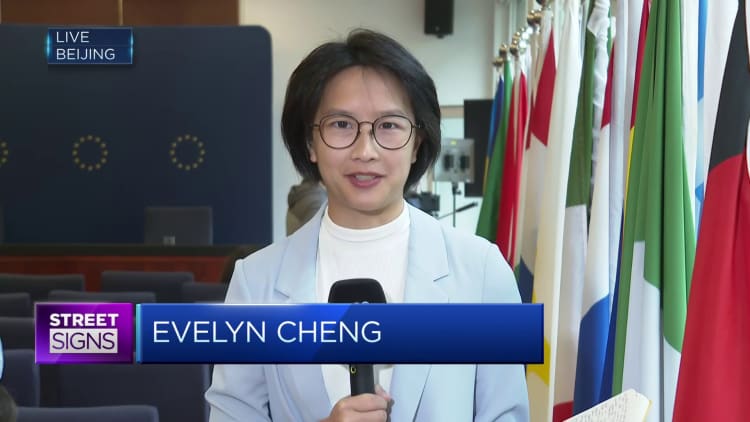The vehicles will be shipped to Europe at Taicang Port on December 19, 2022 in Suzhou, China.
Vcg | Visual China Group | Getty Images
The European Union will have to impose higher-than-expected tariffs of up to 55% on Chinese electric vehicles to curb their import into the bloc, according to new analysis by Rhodium Group.
The findings, released on Monday, come amid an ongoing EU anti-subsidy investigation into electric car imports from China.
Rhodium Group, which expects the EU to impose tariffs in the range of 15 percent to 30 percent on Chinese electric cars, said those tariffs were unlikely to be enough to stop competition from China.
“Even if tariffs are at the higher end of this range, some China-based manufacturers will still be able to generate comfortable profit margins on the cars they export to Europe because of the significant cost advantages they enjoy,” it said. the report.
Chinese companies like BYD, which dethroned Tesla to become the world’s biggest electric car maker last year, can sell cars at much higher prices and profit margins in regions like the EU than domestically, despite paying 10% tariff rate. Chinese EV manufacturers are engaged in an intense price war in their domestic market.
BYD’s Seal U model, which sells for 20,500 euros in China and 42,000 euros in the EU, generated an estimated profit of 1,300 euros in its home market versus 14,300 euros per car in Europe, Rhodium said. Even after 30% in tariffs, a company like BYD will make a higher profit in the EU, it added.
The report said BYD will likely have to cut prices to achieve its goals of gaining more market share in the EU. A 30% tariff rate would still leave plenty of room for that.
“Much tighter tariffs of around 45% or even 55% for highly competitive manufacturers such as BYD would likely be needed to make exports to the European market commercially unattractive,” the report said.
The EU investigation
The European Commission, the EU’s executive body, launched an investigation into Chinese electric cars and subsidies last year, with officials saying the flood of cheap vehicles threatened domestic manufacturers.
According to some experts, incentives introduced in China in early 2010 have led to a surge in startups and increased battery cell capacity in the country, paving the way for globally competitive and affordable electric cars.
Chinese electric car makers already face resistance from the US amid high tariffs and political opposition, making the European market more important for companies like BYD seeking global expansion.

Electric cars from Chinese companies are expected to make up 11% of the EU market in 2024 and could reach 20% by 2027, according to an analysis by the European Federation for Transport and Environment.
When accounting for vehicles made in China by non-Chinese companies, the figure is expected to exceed 25% this year.
Imports of electric cars from non-Chinese firms could also come under the EU’s subsidy probe, with Rhodium estimating that tariffs of 15%-30% could destroy the business of foreign players such as BMW or Tesla that source cars from China.
In response to political risks, EV manufacturers are working to move production to Europe. BYD plans to build a factory in Hungary.
However, Rhodium added that Brussels could use other means to protect the European EV industry, such as limiting Chinese imports on national security grounds or increasing consumer subsidies for EU-made vehicles.
The Chinese government has denounced the EU subsidy probe as “blatant protectionism”, arguing that its companies are simply more competitive than their Western counterparts.
https://www.cnbc.com/2024/04/30/chinese-ev-imports-europe-might-need-to-impose-up-to-55percent-in-tariffs-.html







